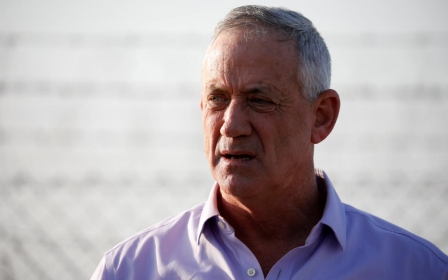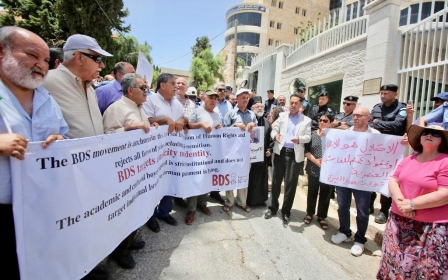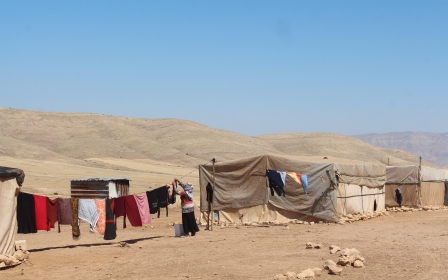Israel press review: Gantz vows Jordan Valley to remain under Israeli control

Benny Gantz, the former army chief-turned-prime ministerial challenger, said the Jordan Valley should remain under Israeli control in any future peace agreements during a tour of the area on Wednesday.
The valley is a fertile area that runs along the west bank of the Jordan river, and is 90 percent in Area C, with Israel retaining control over law enforcement, planning and construction. There are some 11,000 settlers and 65,000 Palestinians living in the Jordan Valley.
“There is no way we can afford the Jordan Valley not be fully in our control," Gantz was quoted as saying by Ynet news site, calling the area "the eastern defensive shield of the state of Israel".
He called for infrastructure improvements to assist Israeli settlers in the area and said Palestinians will be allowed to stay in the valley - but not all Palestinians.
"With great appreciation for the settlers, we need to develop an economic plan to develop agriculture and infrastructure," he said.
“We won’t move Palestinians from the valley. We’ll provide for them all their needs, but we’ll fight against all the water theft and lawbreakers."
Since 1967, when the Israeli army occupied the West Bank, Israel has transferred at least 11,000 Jewish citizens to the Jordan Valley. Some of the settlements in which they live were built almost entirely on private Palestinian land.
Approximately 6,200 Palestinians live in 38 communities on land earmarked for Israeli military use. They have had to obtain permission from Israeli authorities to live in their communities and are often rattled by the military's presence and settler violence.
US BDS resolution 'cyanide in chicken soup'
Israeli right-wing pundits are worried that a resolution condemning the Boycott, Divestment and Sanctions (BDS) movement, passed in the US House of Representatives last week, may do more harm than good for US-Israeli relations.
After a backlash from Holocaust scholars to a similar German parliament resolution, Congress was careful not to accuse BDS of antisemitism. Instead, the resolution - which passed overwhelmingly 398-to-17 - criticises BDS for allegedly standing in the way of the two-state solution.
Right-wing Israelis have said that the resolution boils down to a statement by the House supporting the two-state solution, and an establishment of an independent Palestinian state, which they oppose.
In the right-wing newspaper Makor Rishon, one commentator called the resolution “cyanide in chicken soup”.
Environmental Protection Minister Ze’ev Elkin was quoted as saying that it’s not the resolution itself which is worrying, but “the solid majority in the American Congress supporting two states".
Vice Minister of Foreign Affairs Tsipi Hotoveli added that “such decisions put BDS on the defensive, which is important. Aside from the fight against the boycott, we must not forget that most of the people in Israel understand today that the two-state solution is dangerous, and the official position of most Israeli ministers is against a Palestinian state".
Did Israel bomb Iraq?
Israel is suspected of carrying out air strikes against an Iranian missile base in Iraq on 19 July, despite not claiming responsibility for the attack.
Israeli newspapers have quoted heavily from the London-based newspaper Asharq al-Awsat, which reported that the attack was indeed carried out by the Israeli air force.
Asharq-Al-Awsat reported that F-35s were deployed in the attack. Israel is the only Middle East state that has purchased the expensive warplanes from the US.
Israeli newspapers are not allowed to reveal military secrets, but have reported on the attack as if it originated from Israel.
If confirmed, this would be the first time Israel has attacked Iraq since 1981 when Israeli forces bombed an Iraqi nuclear reactor.
More comforting, than comptrolling
Israel's newly appointed state comptroller has made waves over his proposed plans, which include preventing criticism of the government bodies he is tasked with overseeing.
Metanyahu Engelman, appointed in June, was the favourite choice of Prime Minister Benjamin Netanyahu, who fiercely rejected criticism which the previous state comptroller, Yosef Shapira, directed at his administration.
Engelman made headlines as he laid out his plans, including focusing on the positive aspects of the ministries and institutions which he oversees and informing institutions of any critique which he plans to publish against them before it is made public.
He also severely criticised a Knesset committee which denied Netanyahu’s request for state funds to finance his legal defence on corruption cases.
Both the Haaretz and Calcalist newspapers published articles lamenting the loss of a critical voice in the office, calling Engelman the “state comforter” instead of “state comptroller".
*Israeli press review is a digest of reports that are not independently verified as accurate by Middle East Eye.
Middle East Eye propose une couverture et une analyse indépendantes et incomparables du Moyen-Orient, de l’Afrique du Nord et d’autres régions du monde. Pour en savoir plus sur la reprise de ce contenu et les frais qui s’appliquent, veuillez remplir ce formulaire [en anglais]. Pour en savoir plus sur MEE, cliquez ici [en anglais].




